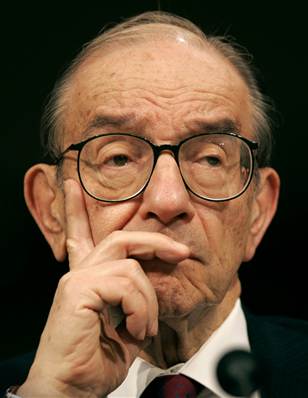
Updated May, 2023
Could Dodd-Frank be repelled soon?
In the world of finance, change is the only constant, and perhaps nothing embodies this sentiment more than the fate of the Dodd-Frank Act. Touted as a crucial shield against a financial crisis akin to the 2008 meltdown, this once-revered law has found itself under the critical scrutiny of financial luminaries. Could it be that Dodd-Frank, which once stood as a bastion of financial reform, is now on the verge of being repealed, fundamentally altering the landscape of the U.S. financial system? The debate surrounding this topic is nothing short of riveting, encompassing an intricate dance between regulatory oversight and the lure of unfettered capitalism.
The Resonating Echoes of Alan Greenspan
Amid the cacophony of financial reform debates, the enigmatic voice of former Federal Reserve Chairman Alan Greenspan rises to the forefront. With an aura of both wisdom and controversy, Greenspan, a towering figure in the world of finance, has dared to ask a question that sends ripples through the economic landscape: “Could Dodd-Frank be repealed soon?”
In a candid interview with Bloomberg Television, Greenspan unapologetically voiced his skepticism about the efficacy of the Dodd-Frank Act. He didn’t mince words when he stated, “I don’t think this bill is working at all and I would like to see it repealed.” These words, uttered by a man who once held the reins of the U.S. central bank, resonate with a sense of urgency and, perhaps, impending change.
The Dodd-Frank Act, passed in 2010, emerged as a bulwark against the financial devastation witnessed in the 2008 global financial crisis. It was conceived as a comprehensive set of reforms to prevent such a calamity from happening again. It brought the financial industry under a tighter regulatory framework, aimed at ensuring transparency, accountability, and stability. However, as Greenspan suggests, this monumental legislation might not be living up to its promises.
The former Fed Chairman’s critique isn’t a newfound revelation. Greenspan’s hands-off approach while at the helm of the U.S. central bank was attributed by many as a factor that fostered the conditions for the financial crisis in 2008. Despite acknowledging the flaws in his free-market ideology, he has remained a staunch critic of Dodd-Frank, which was enacted in the aftermath of the turmoil to bolster the financial sector’s strength and accountability.
The rift between supporters and critics of Dodd-Frank sets the stage for a compelling and contentious discussion. While Greenspan’s call for its repeal emphasizes one perspective, it is vital to recognize that not everyone shares his viewpoint.
Jacob J. Lew’s Defense of Dodd-Frank
In the world of finance, perspectives are multifaceted, and the debate surrounding Dodd-Frank is no different. Enter U.S. Treasury Secretary Jacob J. Lew, who offers a counterpoint to Greenspan’s argument. In separate remarks, Lew underscored his belief in the significance of Dodd-Frank. He emphasized that this legislation has made the financial industry safer. In testimony to Congress, Lew stated, “It would be a mistake to roll back the clock on these protections.”
The clash of these two prominent figures—Greenspan and Lew—reflects the complexity of the issue. Greenspan’s stance advocates for a reduction in regulatory oversight, possibly paving the way for a return to a more laissez-faire approach. In contrast, Lew’s position is to uphold the safeguards and reforms that were instituted in the aftermath of a financial calamity.
The implications of this debate are profound and far-reaching, resonating not only within the hallowed halls of Wall Street but also among ordinary citizens who have a vested interest in the stability of the financial system. The fate of Dodd-Frank has become a pivotal issue that raises critical questions about the future of the U.S. financial system, and these questions are reverberating through the financial world, provoking impassioned debates and discussions.
The Ongoing Dialogue
As this contentious dialogue unfolds, it’s important to acknowledge that this isn’t merely a matter of abstract economic theory or dry legislative amendments. The potential repeal of the Dodd-Frank Act could have tangible and immediate consequences for the everyday lives of American citizens.
To delve deeper into this discussion, it’s crucial to understand that the intent behind Dodd-Frank was to introduce a range of measures aimed at curbing the excesses and risky behaviors of the financial industry. This, in turn, was meant to safeguard not only the integrity of the financial system but also the financial well-being of individuals and families across the nation.
One of the central features of Dodd-Frank was the establishment of the Consumer Financial Protection Bureau (CFPB). This agency was designed to act as a watchdog, overseeing financial products and services to ensure that consumers were protected from predatory practices. Scrapping Dodd-Frank might entail the reduction of CFPB’s authority, potentially exposing consumers to a higher degree of risk when engaging with financial institutions.
Additionally, the Act aimed to create greater transparency in the banking sector. Financial institutions were required to provide more comprehensive information about their activities, enabling regulators to spot potential risks early. The potential repeal of Dodd-Frank could roll back these transparency measures, potentially shrouding the financial sector in a veil of opacity once more.
The Tug of War: Regulators vs. Industry
The tug of war between regulatory oversight and a more unshackled financial industry is a central theme in this debate. Dodd-Frank’s proponents argue that the legislation has been instrumental in preventing another financial crisis and protecting consumers. On the other side of the divide, critics like Greenspan contend that it has stifled innovation and economic growth, making the financial industry less nimble and more burdensome with excessive regulation.
We briefly covered this story in the interim market update; the goal is to slowly prep the masses for some change in lending standards by repelling key elements of Dodd-Frank; banks might provide large personal loans or go back to issuing liar loans. Whatever they come up with, the idea is to get hot money into the hands of the masses so that they can fuel the last stage of this bubble.
The idea of “hot money” flowing into the hands of the masses is both tantalizing and concerning. On one hand, it might invigorate economic activity, spur investments, and lead to a sense of financial prosperity. On the other hand, it could potentially sow the seeds of another financial bubble, a grim reminder of the 2008 crisis. This duality of consequences is a critical facet of the debate.
Naysayers and Their Claims
In the midst of this storm of debate and speculation, there are those who contend that the Federal Reserve, the guardian of the U.S. economy, is operating from a place of fear and uncertainty. They suggest that the Federal Reserve’s caution regarding Dodd-Frank is a testament to its concerns about the stability of the financial system.
However, the perspective from the other side of the divide is equally compelling. Those advocating for a repeal of Dodd-Frank argue that regulatory restraint might inhibit economic growth and individual prosperity. It is, in essence, a clash of ideologies and visions for the future of the American financial landscape.
The question that lingers is: who will ultimately bear the burden of the decision regarding the Dodd-Frank Act? In the grand tapestry of finance, it is often the average citizen, the hardworking individual, who shoulders the heaviest
Other Stories of Interest
EU stands to benefit by Granting China free market status
China cuts rates to boost green energy demand

China showcases its culture to the World
Remaking Moscow lures more Chinese investment
Chinese firms extend Moscow’s rail networks
Russians show patriotism on nuclear bunker tours
Moscow hi-tech parks seek lower production costs
Despite challenges & sanctions: Russian oil & gas remain profitable
Downed Su-24 shows U.S treachery
Global Warming Is Fake: Let’s See If This is True

Chinese flocking to U.S. Real Estate and German Migrant crisis

U.S. backed Coup in Ukraine, China wins, Russia resists



